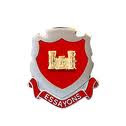I was just 18 years old. I'd skated through high school, studying only when it was measured and recorded. I was sharp enough to be able to sit in class, listen to the lecture and discussion, and glean enough good answers to pass tests with As or Bs.
And now I was in US Army Basic Training, surrounded by young men who struggled with remembering that the right hand and right foot are on the same side of the body. Some of them had never brushed their teeth or taken a shower in their lives. It was winter in Missouri, and the longer it took them to catch on to simple tasks like putting the fuze into a land mine ("righty tighty, lefty loosy") or disassembling an assault rifle, the more miserably cold I was - and the less patient I felt.
You see, I was one of the smartest people in the company. And for all I knew, I was probably one of the smartest people in the Army, if some of my drill instructors were a representative sample.
We'd spent the morning on the rifle range, firing at green plastic silhouettes holding painted AK-47s, the infantry weapon of choice of our enemy - Ivan the Communist. Now, it was time to march back to base for lunch. But before we left, true to form, our drill instructors decided it was time for a little physical training, just to whet the appetite.
PT, as we called it, was torturous. The drill instructors seemed to derive some sick pleasure from seeing us sweating, muscles shaking, faces and bodies covered with dirt, grass and twigs. And so they marched us into a large clear field. We placed our steel helmets and our rifles atop our rucksacks. Then we marched off into an extended formation for an hour of sheer agony.
It was a warm day, relatively speaking, and I knew it was only going to get hotter as soon as the PT Pain Train hit us. So I took my gloves off and tossed them under my helmet.
Marching out to the field I heard Staff Sergeant Mathis call me, "Ellis! Come on over here!" His tone was kind and disarming. "What's wrong with your hands?" he asked with concern.
"Nothing, Sergeant", I replied.
"Look at your hands and then look at the rest of the company. What do you notice?"
I gave him a blank look.
"Where are your gloves?" Still kind and concerned.
"Under my helmet, Sergeant. I knew it was going to get hot." I reasoned with him.
"Why don't you go get them." A statement, and I trotted off to retrieve my gloves. I'd gone about 5 yards when "YOU'D BETTER RUN!" boomed after me and I sprinted there and back.
"Ellis, have you ever done the 'Locomotion'?" Sergeant Mathis asked.
"No, Sergeant," was my watery reply.
Sergeant Mathis then demonstrated a method of walking in which hands are clasped behind the head and, neck and back straight and erect, the victim walks - or runs - touching knees to elbows. He ordered me to run around the extended formation, a circuit of about 100 yards, 3 times and report to him behind the formation of my peers.
I was out of breath when I finished the assignment, but my anguish was not sufficient for Sergeant Mathis. For the next 15 minutes he proceeded to "grass drill" me, running me through a rapidly changing series of push-ups, sit-ups, and running in place. By the time he yelled "Stop!" I had been reduced to tears.
As I sobbed, down in my 3-point stance, Sergeant Mathis quietly asked, "Ellis, do you know why I did that?"
"N-n-no, Sergeant-t", came my reply.
"I did that because you need to understand that you are part of this unit, and part of this Army. You may be smarter than some, and you may catch on quicker than others, but you are not better than any other member of this team."
That experience in humiliation was intensely focusing. I learned a lesson that should have come from Sunday School, or from my parents. In all honesty, it probably had come from those places, but, as the saying goes, when the student is ready, the teacher appears.
I was ready. The teacher appeared. And my life, the way I see and treat others from all walks of life and all levels of society, was changed forever. I suddenly and deeply understood that we are all pilgrims and we are all strangers and we all have things to give and things to learrn. I was not a higher quality human being because I had better hygiene practices. I was not a better person because I was a brighter student.
All of us have an obligation to use the gifts God has given us to improve the world we live in. All of us have an obligation to treat each other well.
As a post script, three soldiers in the rear of the formation, closest to the site of my destruction, looked and laughed as I was being torn down one piece at a time. Their behavior didn't escape Sergeant Mathis' attention and, when he'd sent me back into formation he called the three gigglers out.
What I'd just gone through suddenly looked like a warm-up!
The post script taught me that there can be compassion in discipline, and that there is justice in the world.
26 August 2010
Memories Of A Powerful Lesson...
Posted by The LS Voice at 5:40 PM
Subscribe to:
Post Comments (Atom)




2 comments:
What a timely post. I was just praying last night about how to teach my "very bright" son this same principle.
I don't know whether it will be my lessons, or another teacher's down the road that will stick, but if you don't mind, I'll share your experience with him.
Thank you, Trish! You're more than welcome to share this story. :-)
Post a Comment